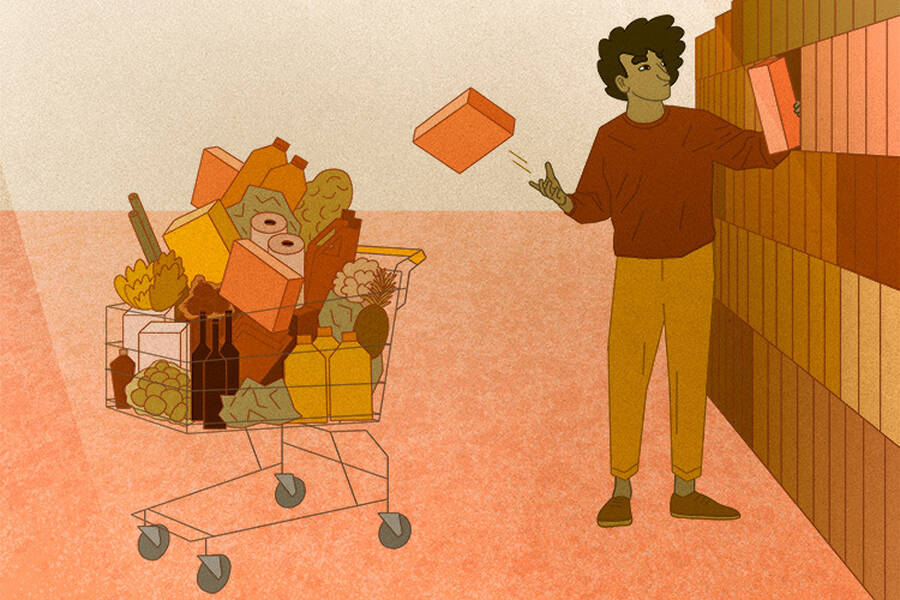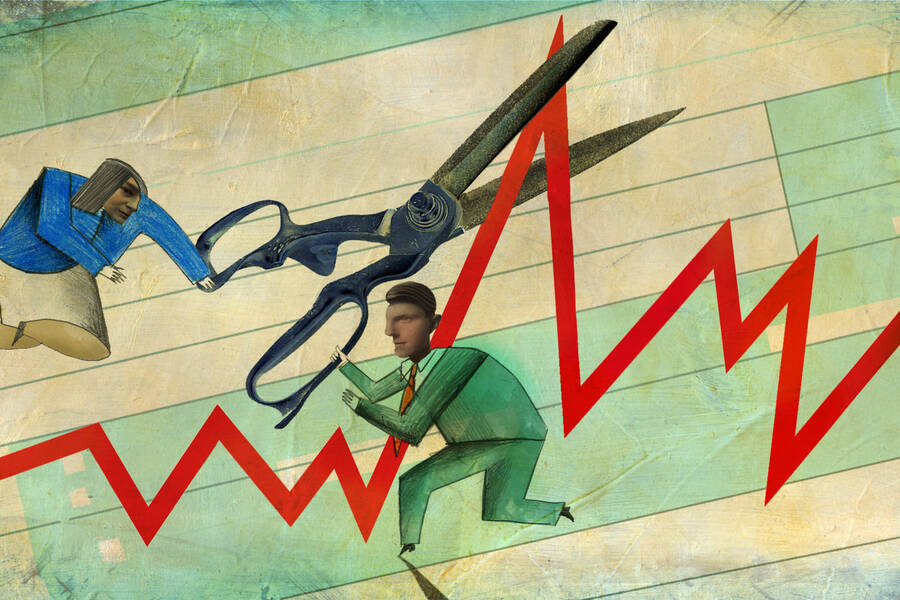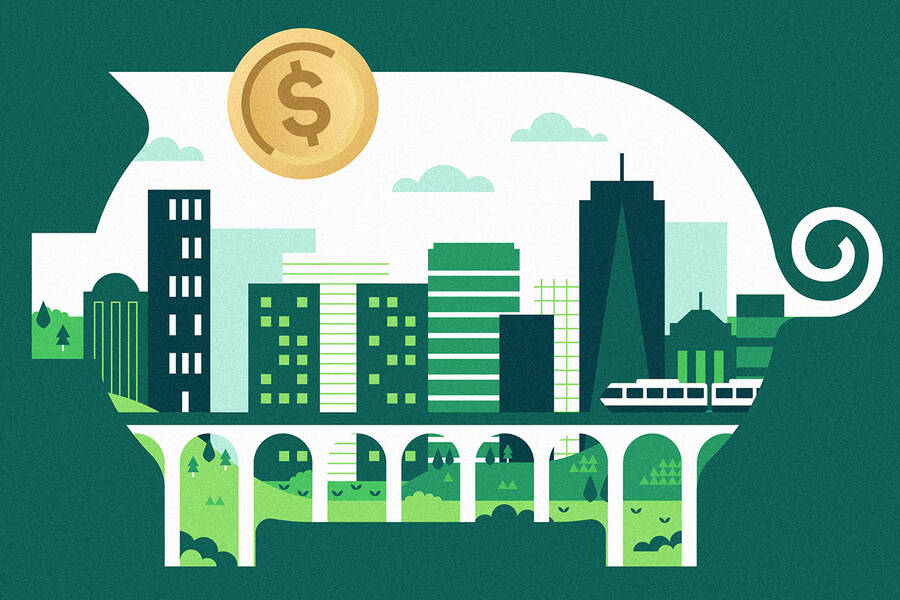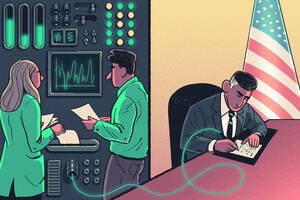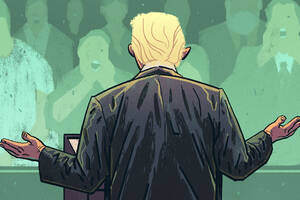Economics Nov 1, 2019
How Raising the Sales Tax Could Help Fight a Recession
New research points to a counterintuitive new tool to spur spending.
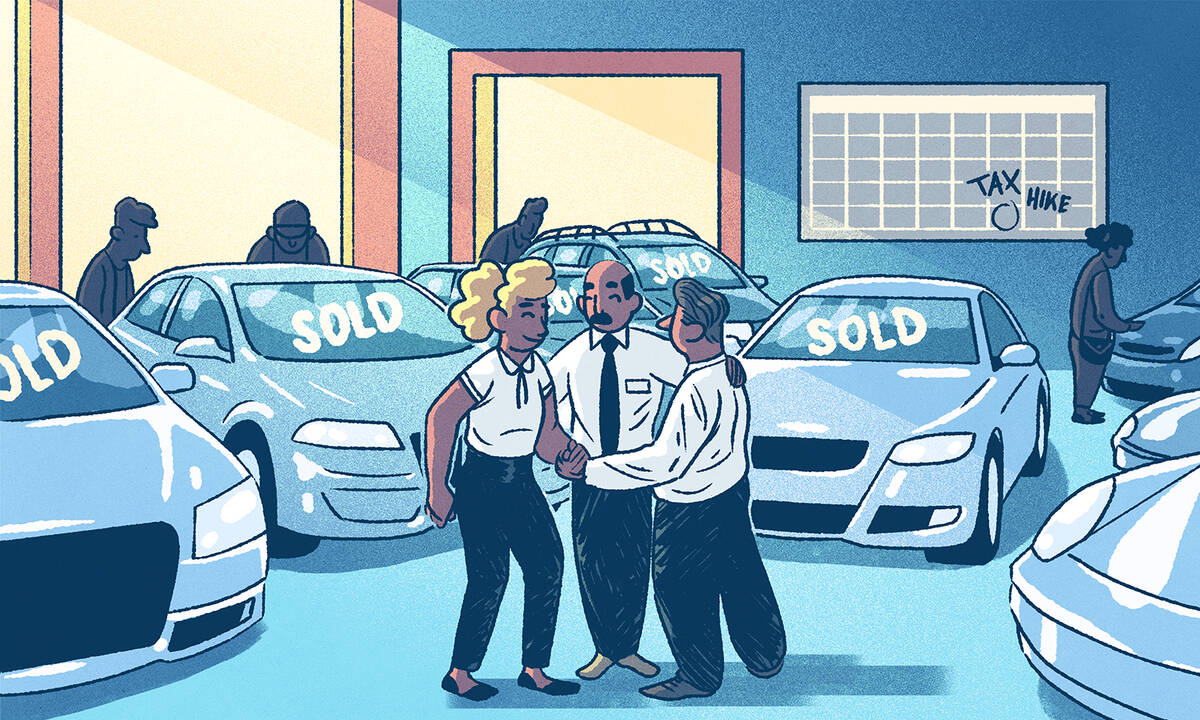
Michael Meier
In the summer of 2007, as home sales were plummeting across the U.S., the Federal Reserve lowered interest rates, hoping that they could encourage consumers to spring for big purchases, like houses and cars, and inject spending into the sluggish economy.
The Fed would cut interest rates nine more times over the next 16 months. In December 2008, its benchmark rate reached an unprecedentedly low 0.25 percent—essentially as close to zero as it can go—yet the economic crisis continued. And, at that point, with the short-term interest rate unable to fall any further, this recession-fighting tool had been rendered powerless.
A few economists, including Scott Baker, an associate professor of finance at the Kellogg School, have since wondered: When a central bank’s all-important short-term interest rate hits its lower limit, what alternative tools can policymakers employ to help lift the troughs of an economic cycle?
In a recent study, alongside coauthors Leslie McGranahan of the Federal Reserve Bank of Chicago, Brian T. Melzer of Dartmouth College. and Lorenz Kueng of the Università della Svizzera italiana, Baker tested the effectiveness of one possible—if counterintuitive—policy alternative: announcing that a sales-tax hike is on the horizon in order to encourage consumption before the tax takes effect.
“The idea is that if demand is low, one way to try to get out of the recession is to pull forward spending from the future,” Baker says. “Saying that you will increase taxes in the future on consumer goods could incentivize people to do that spending now rather than in the future, when taxes will be higher.”
At the outset, the researchers were uncertain as to how effective the sales-tax maneuver would be in the midst of a recession. Would individuals be especially thrifty and motivated to make big purchases ahead of an impending sales-tax jump? Or, lacking access to easy credit, would they ignore the lower-tax window of opportunity?
The researchers used data on vehicle taxes to find out. Baker was surprised at what they uncovered: not only do tax hikes spur new consumption during a recession, but the effect is actually stronger during economic downturns than when the economy is humming along, suggesting that tax rates could indeed be a useful policy in the recession-fighter’s toolkit.
How Do People Respond to Approaching Tax Increases?
In a previous study, Baker found that shoppers tend to adjust their spending on small household purchases like groceries, laundry detergent, and toys to beat impending sales-tax hikes. But he also found that consumers did not ramp up consumption until the month or so before the tax went into effect, despite the fact that the average sales tax was announced six to nine months before its implementation.
Such last-minute shifts in timing aren’t likely to do much to disperse the slow-moving clouds of a recession. In order to substantively smooth out the business cycle, the flurry of pre-tax-hike spending would have to be spread across a longer gloomy period.
The policy could sit alongside others that kick in automatically when certain economic indicators trigger them.
The researchers suspected that people might be most motivated to pull forward their spending by a larger amount of time when they are buying “a more durable good, a bigger-ticket item,” Baker says. “Durability matters because, if an item depreciates or degrades, it makes less sense to buy early or to stock up on it.”
Moreover, from an economist’s point of view, larger expenditures mean more money in the economy during downturns, and therefore they have a greater capacity to counteract a recession.
Baker and his coauthors decided to look at purchases of cars, often the biggest purchase a family makes aside from their home. To determine whether preannounced changes in state sales taxes pushed auto sales forward in time, they needed to examine a timeline of state-by-state sales-tax changes alongside time-specific data on car sales.
In their previous research, Baker and his coauthors had already combed through government documents and online records to hand-collect state sales-tax rates between 1999 and 2017. They had found numerous increases and decreases in state-level sales taxes that they could now use as miniature experiments to analyze the effect on car sales.
In the earlier research, they also found that Google searches using the phrase “sales tax” tended to spike ahead of each change in areas with impending tax increases, indicating that many constituents affected by the taxes knew what was coming.
For car-sales data, the researchers turned to the FRBNY/Equifax Consumer Credit Panel, which contains information about consumers who take out car loans and other lines of credit by sampling a random selection of credit reports. And since some vehicle purchases don’t involve a loan, the authors also obtained data from another source, Experian AutoCount, which reflects vehicle registration records from state DMVs and credit reports, accounting for cars bought with cash.
How Tax Increases Can Help the Economy—Especially During Recessions
Car buyers did indeed speed up vehicle purchases when a tax increase was around the corner. Baker and his coauthors found that auto sales rose by an average of 8 percent in the month preceding a sales tax hike for every 1 percentage point increase in the tax.
Most surprisingly to Baker, the effect was twice as strong during recessions—a whopping 15 percent increase in sales for every 1 percentage point tax increase—suggesting that this technique could indeed be used to stimulate the economy when all else failed.
However, there were some caveats. The bulk of the new spending still took place in the month or two before the tax rate increased.
And not everyone was equally likely to shop for a new car when a tax increase loomed. The consumers most likely to get a jump on a purchase were the highly creditworthy; those with the highest 20 percent of credit scores were twice as likely to beat the tax hike as those in the lowest 20 percent.
So the success of a policy that seeks to spur spending via the announcement of a tax hike would be partially contingent on the widespread access to credit. “If everyone is credit-constrained, it’s going to be difficult to bring forward spending,” Baker notes.
And unfortunately, downturns tend to leave many people especially crunched for credit, he adds. “If there’s a really deep recession, more people are going to see their credit scores going down or their income getting cut, and it will get more difficult for them to pull forward spending. I do think that has the potential to mute the impact.”
Bigger Tax Increases, Bigger Impacts
So how well would an advertised sales-tax hike work as a recession-busting policy tool?
Baker says that the answer probably depends on the size of the tax. In the study, most of the anticipatory spending was still constrained to just one or two months before a sales-tax change—not sufficient to offset a recession. But Baker and his coauthors argue that if the boost to the tax were larger, the spending impact would likely be seen across a longer span.
For instance, if the tax increase were ten times greater than a typical one-percentage-point change observed in their research—meaning the current average state sales tax would jump from 5 percent to a staggering 15 percent—the authors calculate that consumption could move forward by as much as sixteen and a half months. This spread would almost cover the length of the Great Recession, which stuck around for roughly eighteen months.
Because the U.S. does not have a national consumption tax, most experimentation with such a policy would likely be at the state level. Even there, Baker acknowledges a new tax policy—especially in the midst of a recession—would likely face strong political pushback from many within state legislatures.
However, Baker says, other economists have suggested ways to raise taxes without slowing down a recovering economy. “You would hike sales taxes by a large amount but also send out a check to everyone in the country—like the tax rebate checks issued in 2001—so that, on average, there is no increase in net taxes paid,” he says. “You’d get, say, a $500 check in June so you can spend more now. Then sales taxes go up the following January for 18 months, and those taxes basically recoup that $500 over time.”
Plus, Baker imagines that the policy wouldn’t need to be reapproved every time a recession looms. Instead, it could sit alongside other policies that kick in automatically when certain economic indicators trigger them.
“In theory, this would be like unemployment insurance benefits, which get automatically extended at a predefined level of unemployment rate,” Baker says. “You could say, for example, that there’s going to be a temporary tax increase, and it naturally acts to move a bit of spending from expansion periods to recession periods. It would be part of the natural stimulative toolkit.”
